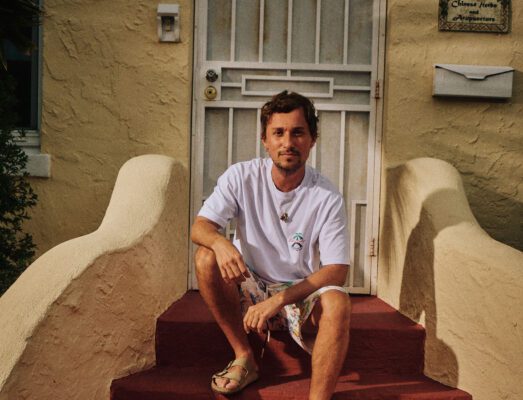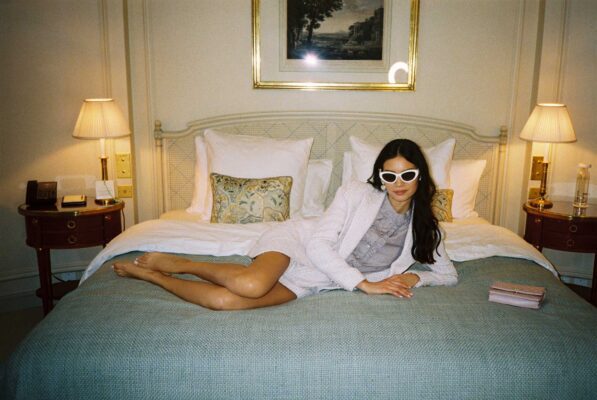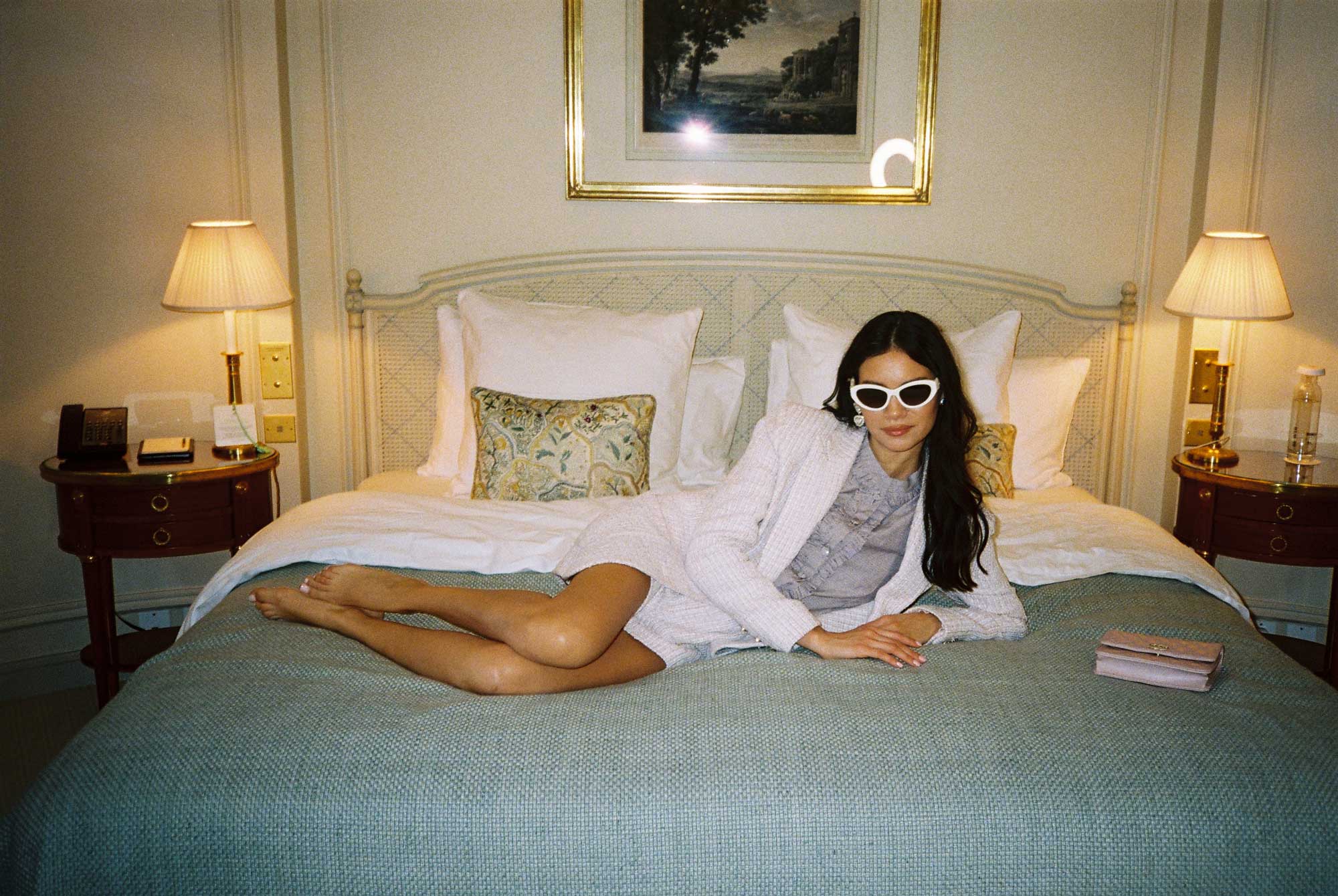
Juana Burga, in her room in Paris getting ready for the CHANEL Fall-Winter RTW 2024/25 fashion show. Photo by Miguel Peña, courtesy of CHANEL.
COFFEE WITH
JUANA BURGA: “I CAN GIVE LIFE TO THAT LATINA VOICE”
Name: Juana Burga
Profession: Model, Actress
Nationality: Peruvian
Instagram: @juanaburga
On March 5th, CHANEL presented their Fall-Winter Ready-to-Wear 2024/25 collection at the Grand Palais Éphémère in Paris, paying tribute to the town of Deauville, where Coco Chanel opened her boutique in 1912. The show opened with a love story set in Deauville featuring Brad Pitt and Penelope Cruz, captured by Inez & Vinoodh.
Among the guests in attendance was Peruvian model, actress and activist Juana Burga. We sat down with her over cafecito at the Ritz Paris to discuss life in New York, the various aspects of her latinidad and the relationship she has developed with the French label.
LATINNESS: Juana, thank you for accepting our invitation. You were discovered as a model at a very young age. Do you believe in luck?
JUANA: It depends, because luck means so many things for me. I think destiny definitely has a little bit of luck involved, but it was the desire of having something in my life that I didn’t know, which took me out of my comfort zone.
I’m a person who tries to challenge my comfort zone because when I get very comfortable in a situation, things stop moving. I always try to find a new place.
That was my reason to travel and say, “Here is a ticket, you are 16 years old, you don’t speak any language, you have to travel without your parents and start in an industry you don’t know.” When I started seeing the references of modeling in the fashion industry, it was very interesting to see that the girls– especially those walking in the shows– were very similar to me in appearance.
Before working in fashion, I was very insecure. I was very uncomfortable with the way I looked as a Latina woman in the idea of being a model in Peru, for example. It was a little tough to accept myself, to love myself, and I just felt that I didn’t fit there.
I think fashion brought that to me, the confidence that I needed, and I felt so much a part of it. For me, it was just about being open, right? Like an open book, a diary, and to just start filling that diary with all my experiences. I learned the language, I learned the culture, and I learned the industry.
LATINNESS: How did you transition from modeling to discovering film as your career path?
JUANA: Well, it was interesting because I’ve always loved motion pictures. Modeling and photography connect me a lot with finding that character, finding that personality. It was just a capture of the moment. It was always very important for me to connect and be very open with the photographer, to communicate, to build that character.
From the moment you arrive at a photoshoot, you don’t really know what’s going to happen, although you have the moodboard and you have the outfits, it’s just a connection with everything with them. Once you have the makeup, once you have the hair, once you have the outfits, you create the persona, the character. So I feel like that’s kind of a connection with acting.
Every time Pat McGrath or Charlotte Tilbury would do my make-up, they would say, “You have a very film face, you could do film. Have you ever thought about it?” I had just started modeling, I was 16 or 17. I had no idea what I wanted to do. I was like, “I’m barely understanding this. Please let me just do this, and then I’ll think about it.”
That first year people would also say, “You look like Bianca Jagger”. I started googling her and learning about her story, and I saw the resemblance. I was like, “I could be her, I love her style”.
LATINNESS: So effortless.
JUANA: Effortless, but chic. You know, it reminds me of when I would see pictures of my grandmother and I would watch her put on her high heels, tight waist, beautiful dresses, patterns, and thought, “Wow. This is the true Latina, right?”
LATINNESS: …And then dancing until the wee hours of the night.
JUANA: Dancing and experiencing that happiness. Embodying that very elegant, yet very sexy, very happy, very carefree and effortless woman that we are as Latinas.
Now in my acting career, that’s what I try to represent. That Latina, the power of a strong Latina, which is not what people think about us. Actually, we are stronger than that. We have so many Latinas we can be proud of, who have changed so much of the world. Now through film, I can tell their stories, I can represent them and portray this very strong, powerful Latina that I’ve always loved.
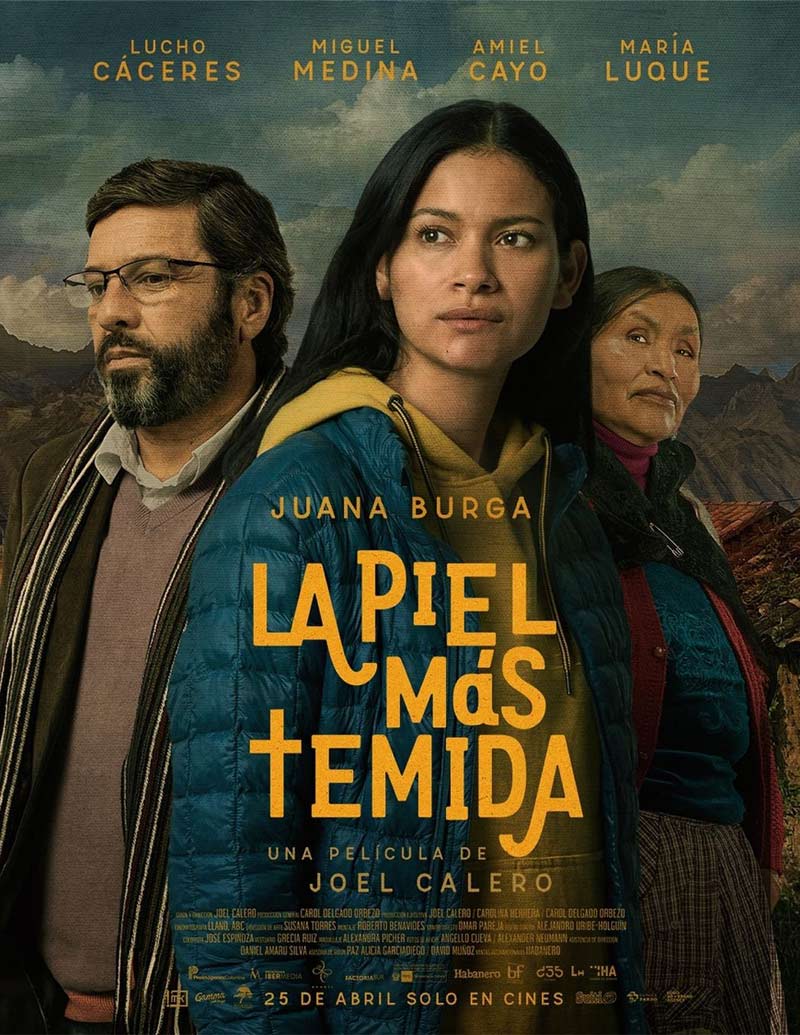
Poster and scene from the film “La Piel Más Temida”.
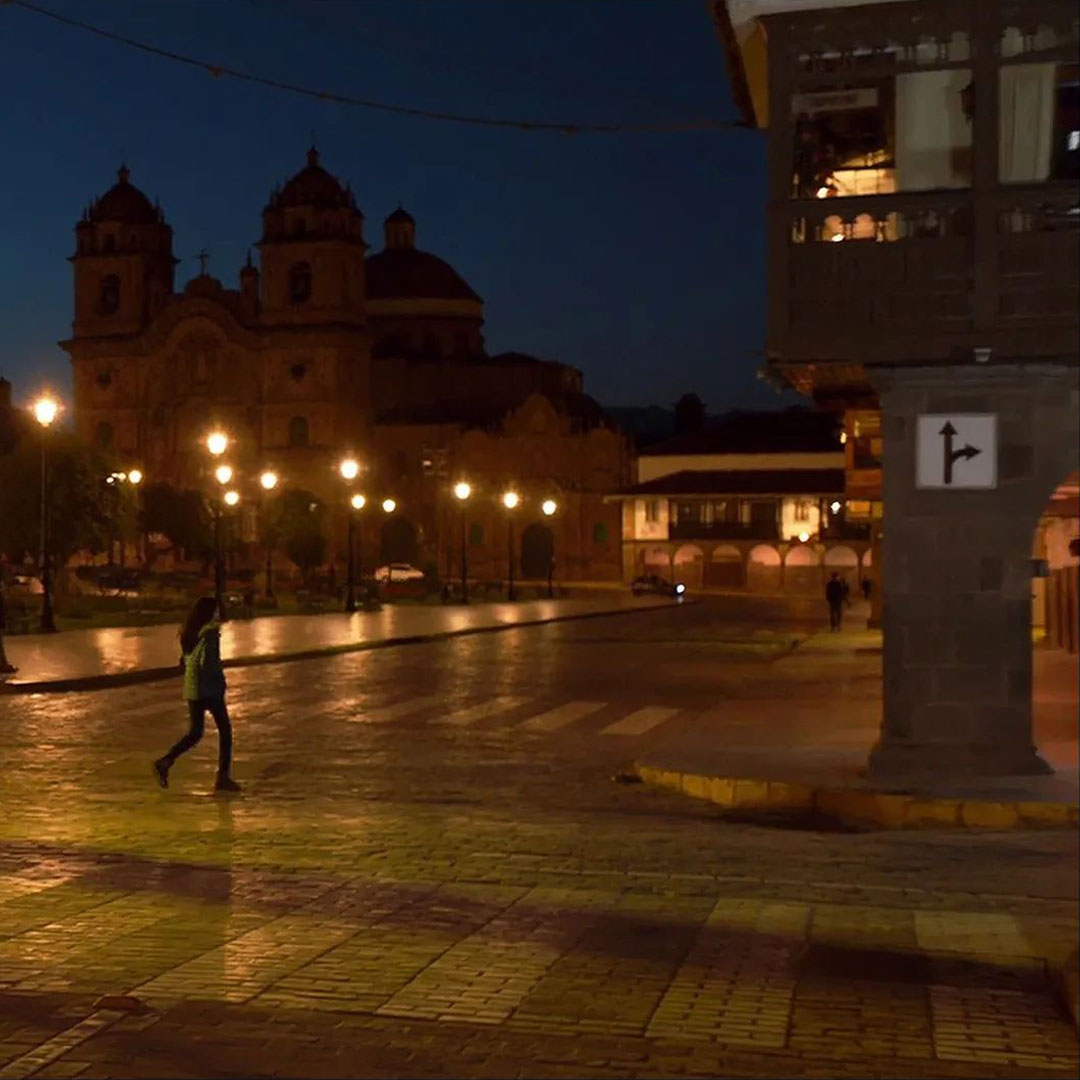
LATINNESS: On that topic, you just wrapped up a film that’s entering the promotion phase now in April about a powerful Latina. Can you tell me more about it?
JUANA: It’s an interesting film about the journey of my character, Alejandra. She’s a girl who had to flee Peru at a very young age due to political issues, and never knew much about the country.
Eventually she had to return to Peru to sell her mother’s house because she was very close to her. She never knew much about her father. That was the connection to Peru and Latin America that she was missing.
So she knew she looked Latina, she knew she came from Peru, but not much else. This trip for her was a reconnection with her culture, with discovering the truth about her father, understanding why her mother left and did not want to return.
It’s such a beautiful story that many Latinos have experienced. And not just Peruvians, but also Chileans, Cubans… many of us have gone through this. I have a lot of friends whose parents had to make sacrifices, they left their countries, and even now, are still afraid of returning.
LATINNESS: Migration is such an integral part of all our stories. You migrated yourself, so it must be beautiful to come back to your roots by filming in Cusco.
JUANA: Yes. I went back to Cusco, a city I truly love. I am so proud to be Peruvian, to call Peru home and to go back to Cusco to film for two months.
It was wonderful because I usually go to the main city and often don’t see the little corners and small towns. It is so important to connect my character with Alejandra, because I’m very connected with my roots, and represent Peru wherever I go.
That said, I still need to discover more about my country because it’s impossible to know it all. It was very special visiting the small towns that have little access to the world that we live in. It was really beautiful to hear their stories, see how they live and film in their communities. This was the first time they had seen a film camera. They were very excited and happy about the crew coming to film there.
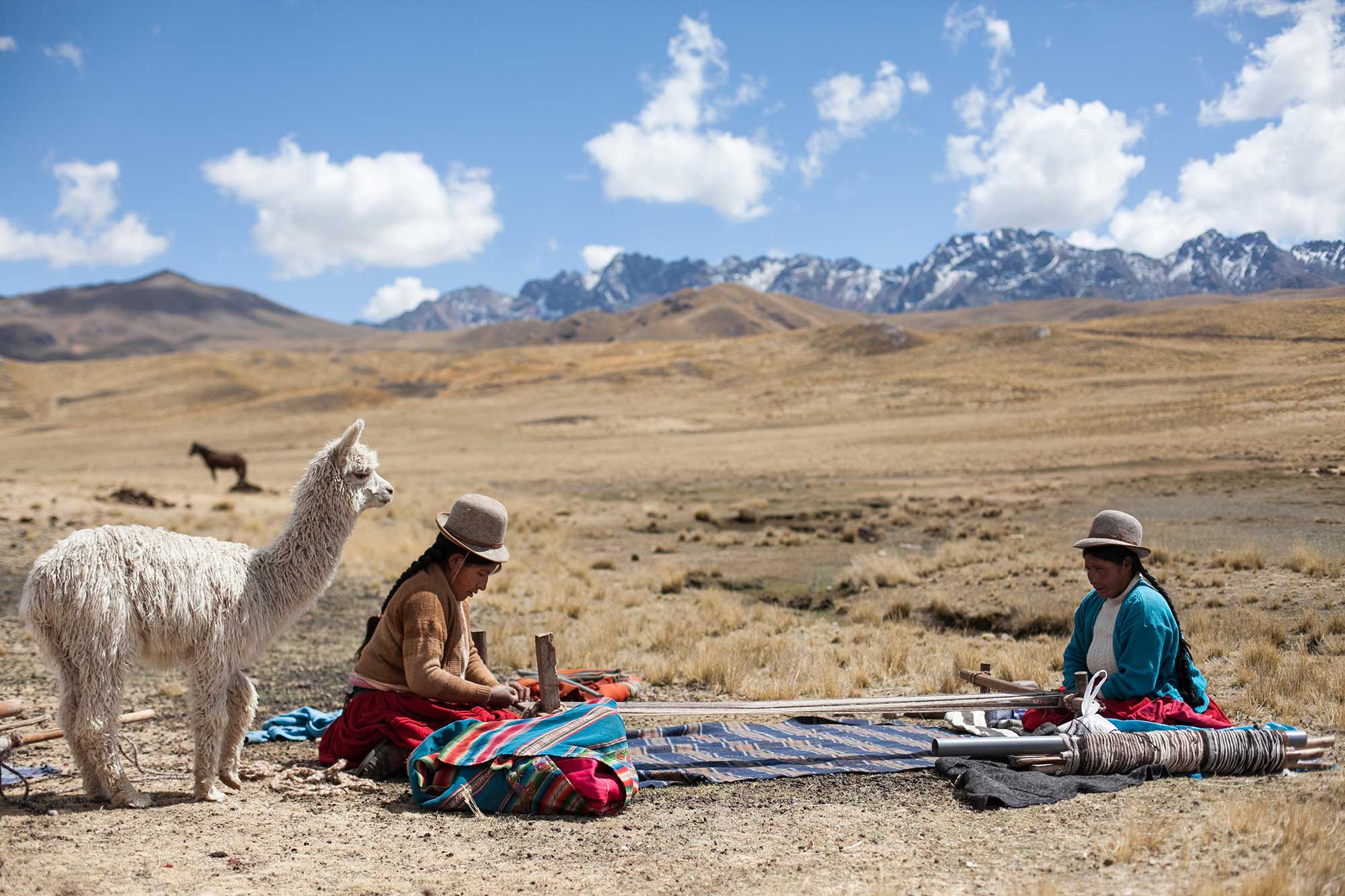
Nuna Awaq celebrates Peruvian craftsmanship by giving its artisans a voice. Image by Carlos Garavito.
LATINNESS: As you’ve mentioned, you’ve always been a very proud Peruvian and a great ambassador of your country through your platform Nuna Awaq. Can you tell us more about this project?
JUANA: Nuna Awaq is a passion project of mine that comes from the heart. It represents the strong cultural heritage that I come from.
I’ve always valued these ancient techniques, and one of the things I discovered while modeling in the fashion industry is that a lot of brands work with alpaca fibers from Peru. But it’s much more than that: it’s so much knowledge, so many traditions that now some brands or collections pull inspiration from, but they don’t highlight the artisans.
That was one of the motives behind putting in my entire effort into creating Nuna Awaq. It was to empower the artisans, as an artist, as a worker, but also as the engine of sustainable fashion, because sustainability wouldn’t be this strong right now if it weren’t for them carrying on these traditions for so many years. And these traditions are getting lost. The new generations are not keeping up with them. They are not learning. So if we don’t empower them, if we don’t show them that the world really needs these traditions, that they can continue proudly passing on these different techniques, they will disappear.
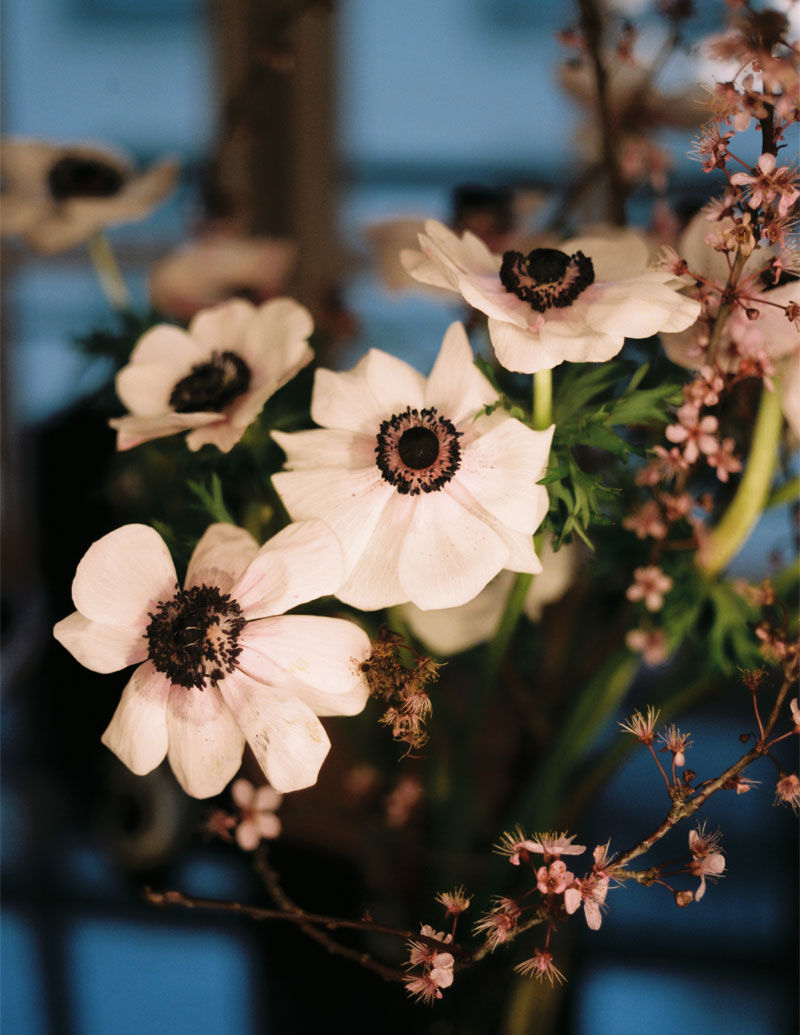
Juana Burga wore a look from the CHANEL Spring-Summer 2024 Ready-to-Wear pre-collection.
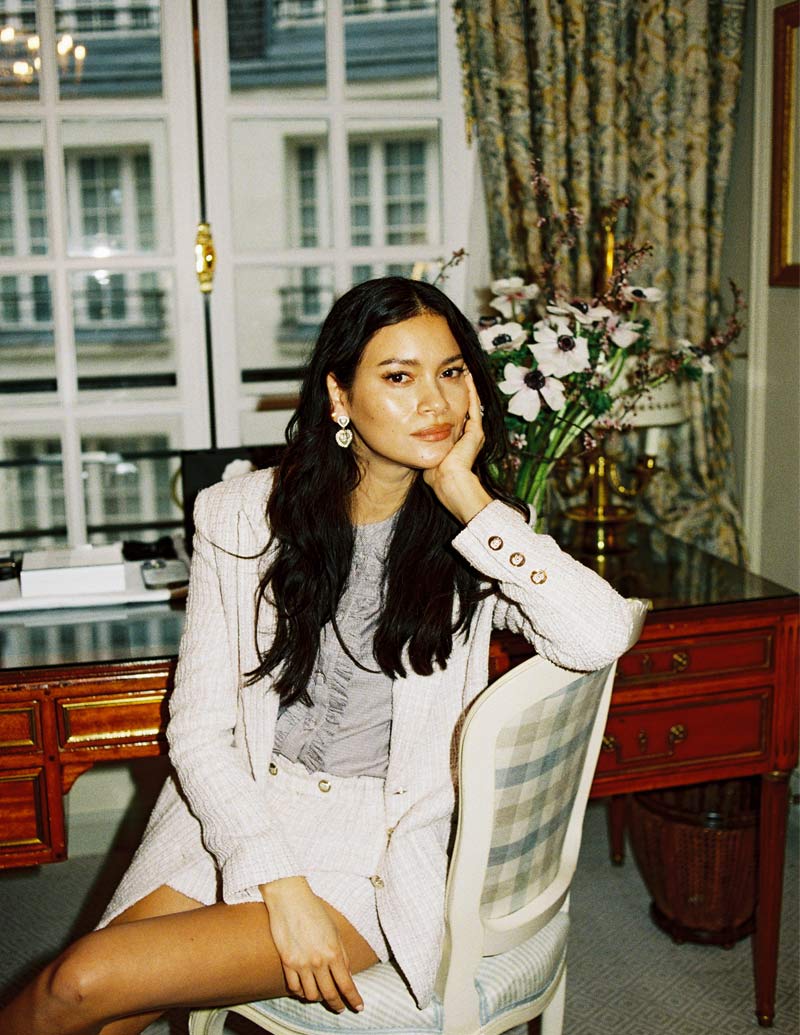
Photo by Miguel Peña, courtesy of CHANEL.
LATINNESS: Of course. Well, now we’re here together after the Chanel show, a brand known for upholding French craftsmanship and tradition. Tell me more about your relationship with Chanel; what was your first memory with them?
JUANA: My first memory was in Cannes for the Cannes Film Festival. They told me we were shooting a story for a magazine and I had to fly there. I also had a screening in Cannes, then afterwards I took a plane here to shoot a beautiful outfit on the rooftop of an old building in Paris.
It was beautiful weather, and the look was so stunning, so Chanel, so chic, so elegant. I thought, “Oh, God, I’m born to wear these!” We all know Chanel, what it represents as a brand and how it empowers women. It really represents women in this elegant way that we all should feel at some point. It just really connects with my personality and makes me feel very excited.
LATINNESS: Also, the job that the House has done in preserving the craftsmanship and the artisans through their own Métiers d’Art. There are a lot of similarities with what you’re trying to do.
JUANA: Exactly.
LATINNESS: Can you walk us through the day in your life, perhaps a day like today?
JUANA: A show day starts very early in the morning. The night before I make sure to rest so that I wake up with the most energy possible. Then, I mentally prepare myself for a long day because they’re usually very long. But, of course, this time I was very excited about being a guest at the Chanel show for the first time, which was a different feeling.
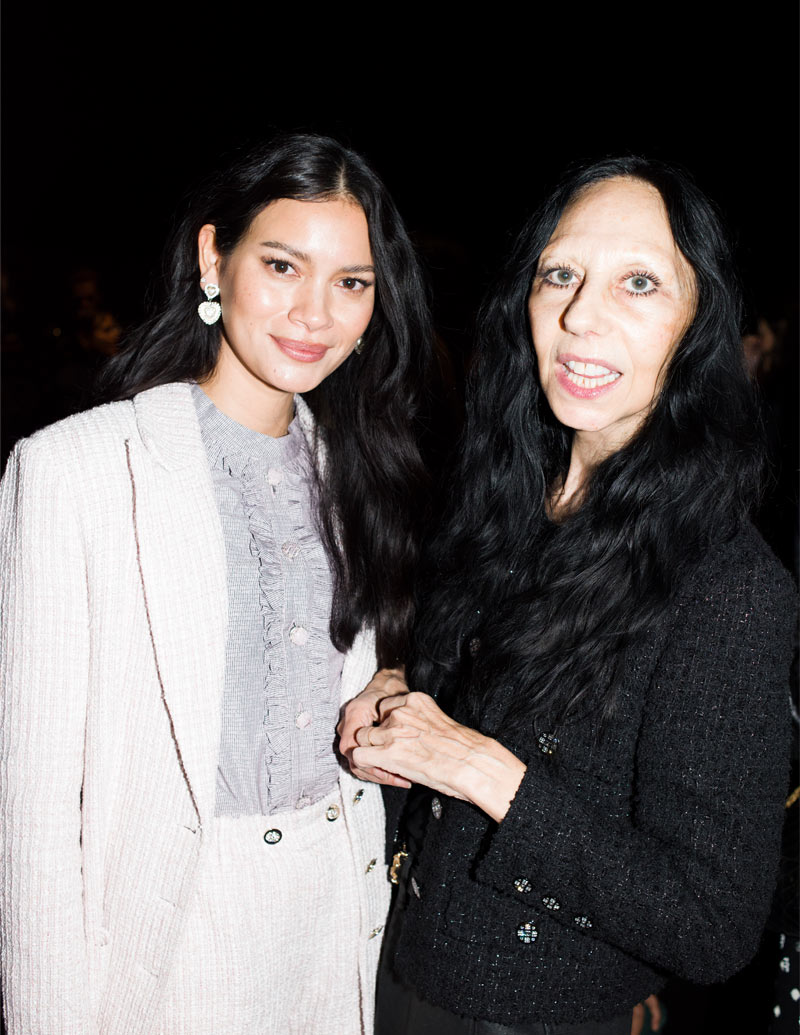
Juana Burga with the photographer Inez van Lamsweerde.
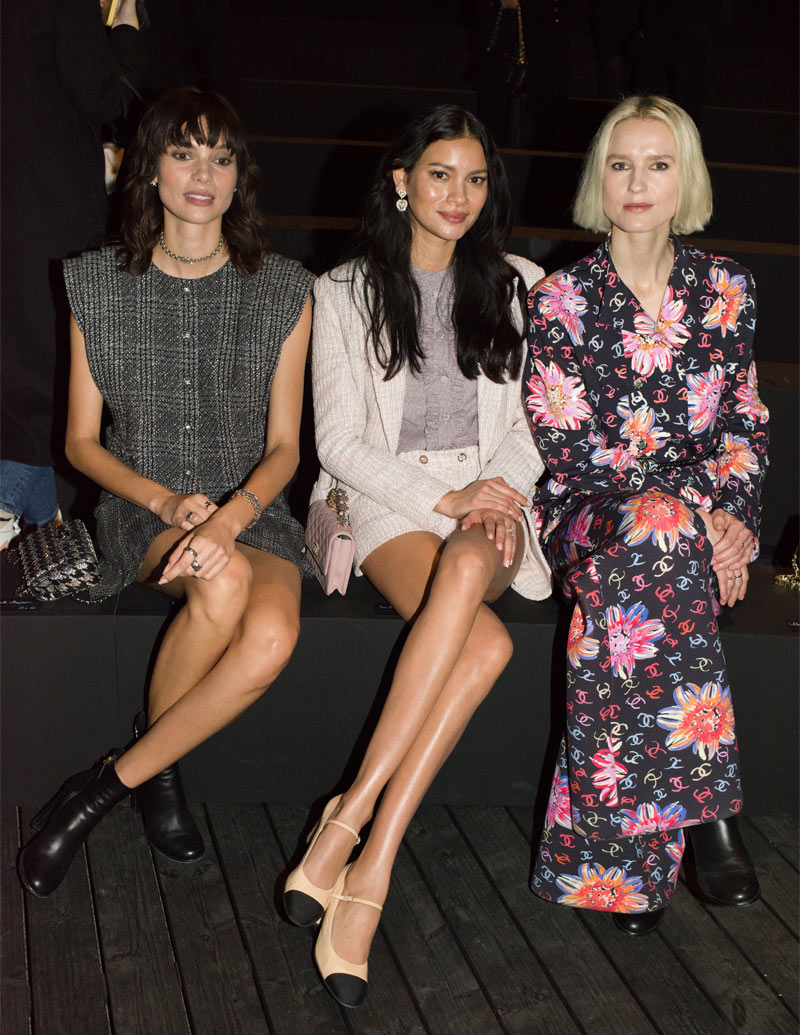
Charlee Fraser, Juana Burga and Amanda Collin, at the CHANEL show.
LATINNESS: You had modeled before?
JUANA: I had modeled for Chanel, but this is the first time I was a guest at the show, so I never experienced this. The first time always gives you butterflies, which I thought I had under control, but I was very excited.
Getting ready for a day like this is just about doing a beauty routine: hydrating my face and trying to be as glowy as possible to prepare for the makeup. Having my makeup and hair done for a day like this is very important because I try to save my energy for everything that is coming.
The team was incredible, so I opted for a very effortless, natural look, like “I woke up like this” complemented with a messy, chic Parisian hairstyle that I really wanted to do for this specific look.
LATINNESS: And Latinas age well, don’t we?
JUANA: That’s definitely something that I’m experiencing now with age: first, getting to know my skin and understanding how aging is so important for a woman, but scary, as well. You don’t know how that transition from your 20s will go. I started so young, left Peru, and am constantly rediscovering myself.
Depending on where I find myself, I’m always trying to adapt to the culture. I’m discovering new personalities within myself all the time, new ways of being a woman in that moment, in that era.
I think that’s the beauty of being a woman: the strength you have is the strength that you’re going to portray in every moment and project with everything you know and everything you do.
LATINNESS: And with age, my biggest beauty secret now is learning to say no.
JUANA: I think as you age, you learn things that maybe in earlier times you didn’t really give time to yourself.
For example, my best beauty routine is understanding my body’s balance and trying new things, like cold plunging. You know, I’m Latina, I don’t like the cold. It’s something I’ve never adapted to anywhere, but doing cold plunges takes me out of my comfort zone. It’s something so new and feels so good, although it’s a challenge.
I think with age you definitely become wiser, but you’re also much more open to learning about yourself and accepting yourself.
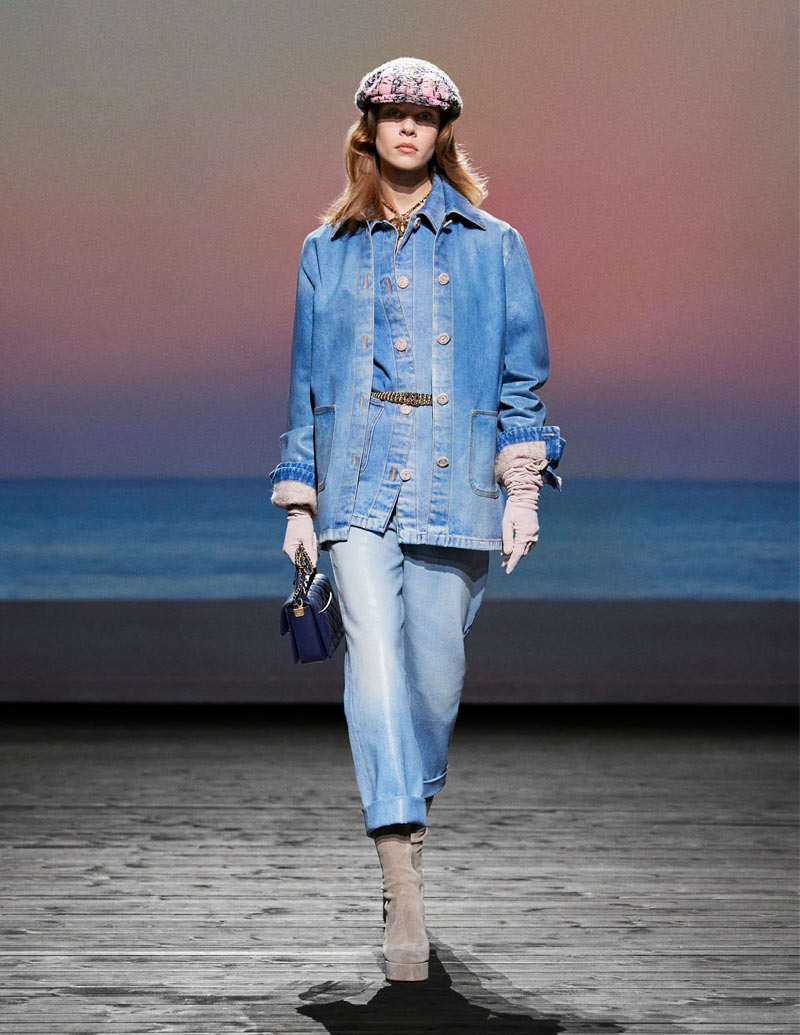
Looks from the CHANEL Fall-Winter RTW 2024/25 runway show.
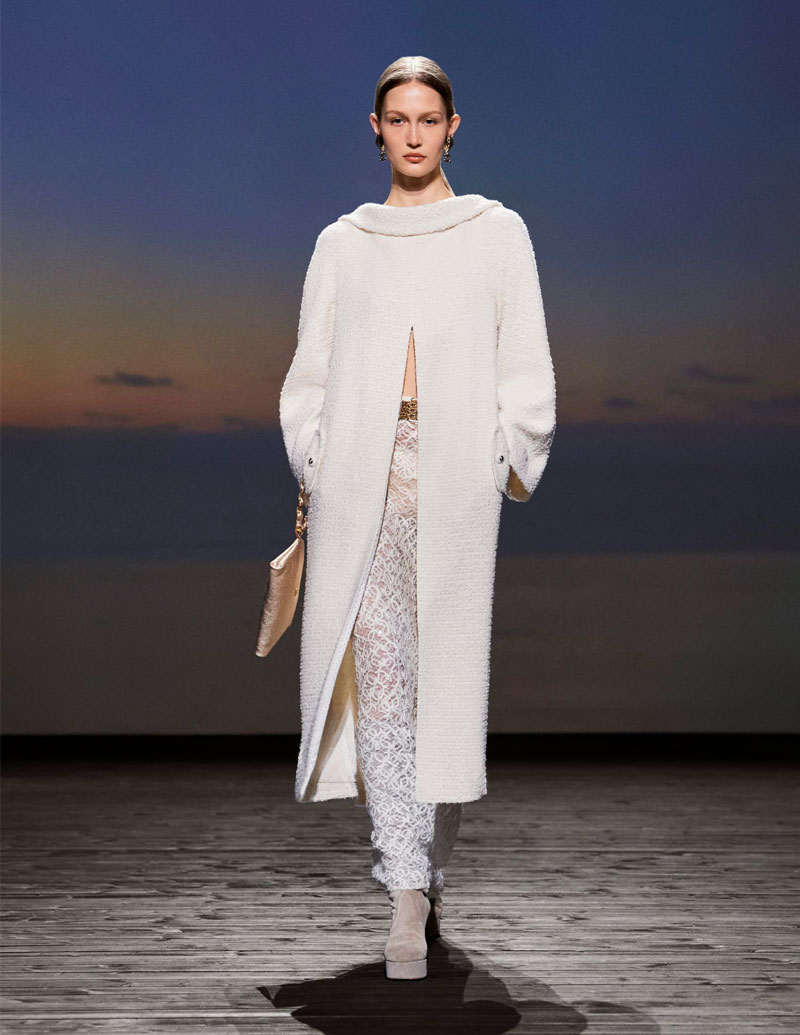
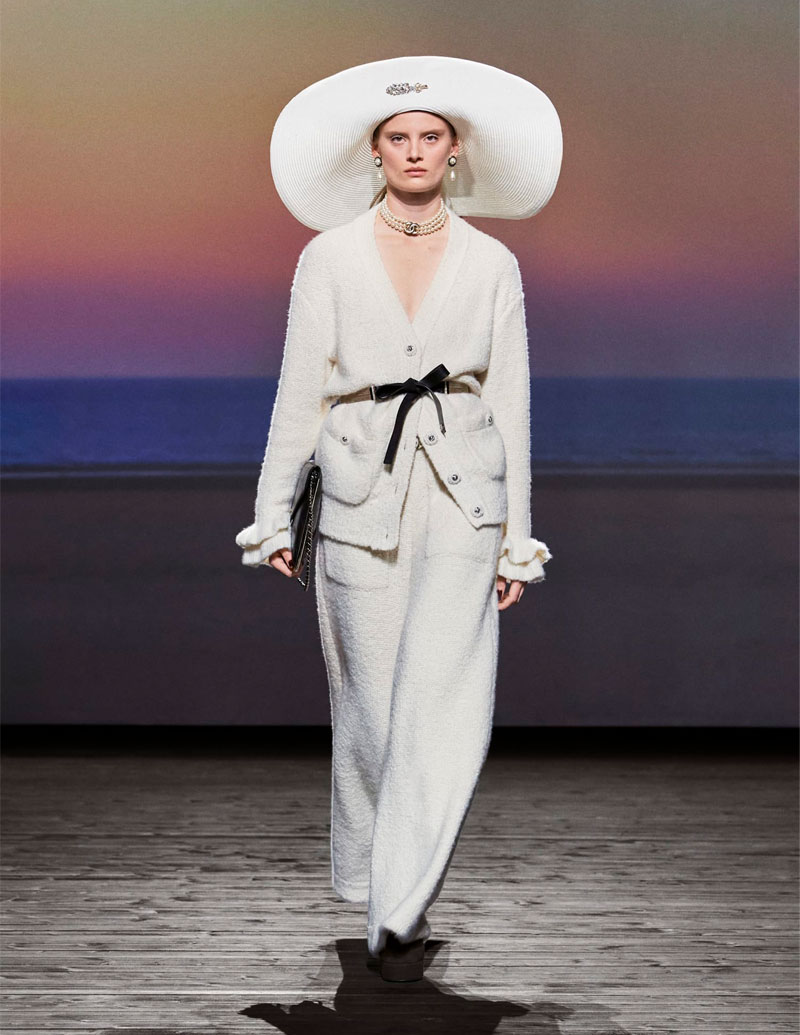
LATINNESS: Was there a specific look that spoke to you from the show? You would look amazing in the white looks, very Bianca Jagger.
JUANA: Very Bianca Jagger. I loved the hats, and one of the looks that I was very shocked to see was one denim look, the jacket. It was a denim effect, but it was leather. If you didn’t really pay attention, you wouldn’t see it was leather. It was fantastic.
Something I also noticed is how fashion is adapting to our times because seasons don’t exist anymore. It’s no longer about fall/winter or summer/spring or pre-summer, pre-winter, couture or anything. It’s just adapting to how the world is evolving.
Before we saw fall/winter and would associate it with darker colors, like browns and blacks, but this collection had a lot of pastels. That’s actually very beautiful to put in a fall/winter collection, because times are changing. I think it’s so important that when you dress on a rainy day or a cloudy day, you can actually bring some color with you. It’s beautiful because that’s what I’ve experienced.
For example, in Copenhagen or New York in the wintertime, if it rains, no one goes out. If it snows, they cancel schools, they cancel everything. In Denmark, rain, snow, anything, you don’t cancel, you go out. That was actually something I’ve never experienced before, because that was your excuse, right? To stay cozy at home.
There, however, you have to get out. So I was like,”Okay, then I’ll wear a pink jacket or a yellow jacket or an orange jacket, just to bring color.
LATINNESS: It’s true, it’s very cultural. On that note, what do you love the most about your Peruvian culture?
JUANA: One of the things that makes me very proud is my heritage, the culture behind my ancestors. The culture I’ve been taught since I was a little girl and continue to discover. It keeps me very grounded, discovering more stories of powerful Peruvians, powerful Latina women, and I think there are so many more out there that we don’t know.
That’s why I’m so proud to be Latina, because there are so many powerful Latinas whose stories remain unheard and unknown, and I think with the platform I have, I can give life to that voice.
Images courtesy of CHANEL, Miguel Peña, and Juana Burga.

